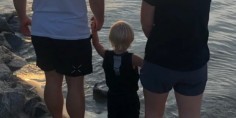When Catherine and Karver Bolton began taking classes to become foster parents, their trainers from Crossnore Communities for Children told them that, whenever safe, adopted children should be allowed to keep in contact with their birth parents.
The Boltons took that to heart.
They began fostering 5‑year-old Nasir some four-plus years ago and legally adopted him last summer, but they still arrange for him to talk with his birth mother, Irielle Harrington, on occasion.
“We’ve seen her once or twice since the adoption,” Catherine says. “From the beginning, that’s been something that I really cared about. If (continued communication) can be done, it’s the child’s key to understanding themselves and where they came from.”
Irielle, 23, feels grateful and relieved that she can stay connected to Nasir. She says she had children too young and couldn’t meet their needs. Two of her other children – twins – were adopted by another family. The Boltons say they are friends with those adoptive parents, and Nasir gets to keep in touch with those siblings as well.
Irielle, who is raising two of her own biological children, is happy he’s in a good home.
“It’s great. I still get to see him grow up and transition into who he’s supposed to be,” she said. “Most (birth) parents, they don’t really get the chance to have a relationship with their child after they’re adopted. I feel like some adoptive parents, they basically judge you … But I get along with Catherine great. We try to stay connected for the kids’ sake.”
She added that Catherine has become a good sounding board for her.
“If something happens like a stressful day, we’ll talk about it. She gives me great advice,” Irielle says. “I feel like she’s just a person who wants to see me grow and strive and do better.”
Catherine, who also has three biological children, says she texts with Irielle multiple times each week, letting her know how things are going with Nasir. The two families live hours apart, but the texts help keep communication flowing. The Boltons also feel an added imperative to keep the dialogue open: they are white; Nasir, like Irielle, is African American. The Boltons say they strive to expose him to racially diverse environments in church, sports and other aspects of everyday life. Still, they believe communication with his birth mom helps him understand his past and present.
“I just love that Nasir is getting that,” Catherine says. “Of course, not everybody’s biological family is in a spot where they can do that. But Crossnore from beginning to end has just been so helpful” in supplying guidance and pointing out the benefits of continued communication.
When Nasir was in the foster care system, child welfare rules dictated visitation and communication between him and his birth mom. Now that he’s legally part of the Bolton family, Catherine, Karver and Irielle navigate those questions for themselves.
“We’re still doing the dance of figuring out what this is, and what is it going to look like going forward,” Karver says. “We know it’s going to get more complicated for Nas as he gets older and has more questions. But I think what Catherine is really leading our family on, with support from Crossnore, is setting a good tone so that when things do get more complicated for Nas, he’s going to know he’s loved – not just by us, but also that his (birth) mom is there too as he starts to wonder why his life is a little bit more complicated than his siblings.”
Even though the adoption has been finalized, experts from Crossnore still help the Boltons with ongoing issues and questions.
“Sometimes I feel like they’re my therapist because they just understand what’s going on,” Catherine says. “They’ve been part of not just our family situation and Nasir’s family situation, but the (child welfare) system as a whole.”
Nasir, the second-oldest child in the Bolton family, is enjoying a happy childhood. He shares a bedroom and a set of bunk beds with his older brother. They’re inseparable in the backyard, constantly playing soccer and basketball.
“With him being the second oldest, he’s been the big brother who’s welcomed home two younger siblings who have been born since he’s been in our family,” Karver says. “So, there’s this sense of security and belonging, that he has just been part of the natural course of things for our family.”
Irielle has made peace with the situation too.
“In some cases – maybe not all – but sometimes, it can be a good thing that your kid is adopted. I feel like (Catherine) helped me in a lot of ways,” she says. “She picked up a responsibility I wasn’t able to really take care of. I was young. I’m still young. But I’m learning.”
Catherine recalls being on the phone recently with Irielle. She put the phone on speaker so Nasir could talk, and he told Irielle: “Mommy, I love you.”
“I mean, I could just cry,” Catherine says, recalling the moment. “He is incredibly resilient. It’s just phenomenal to me to watch him. He’s been through something so complicated … and yet here he is, just feeling loved. Having two moms is just his normal, and he loves us both. It’s just really incredible and beautiful to me. He is really special.”


